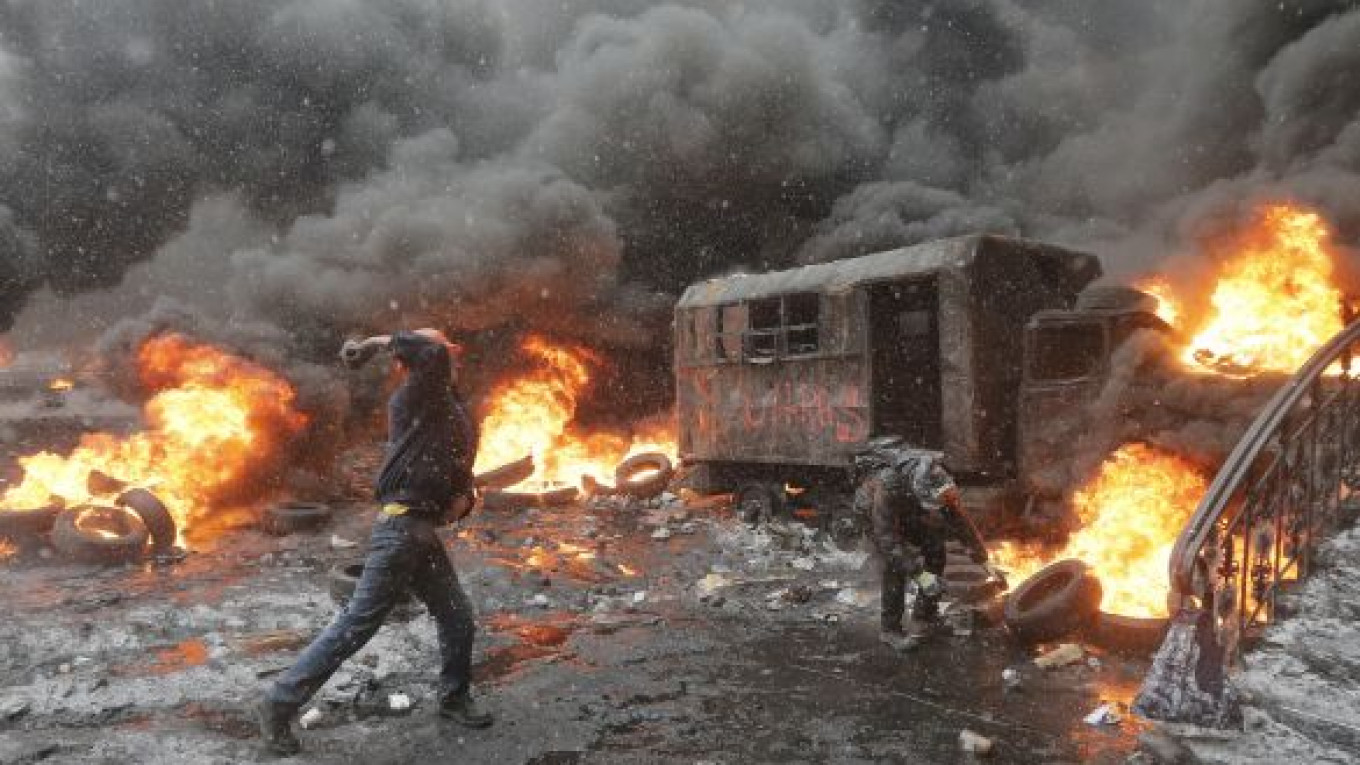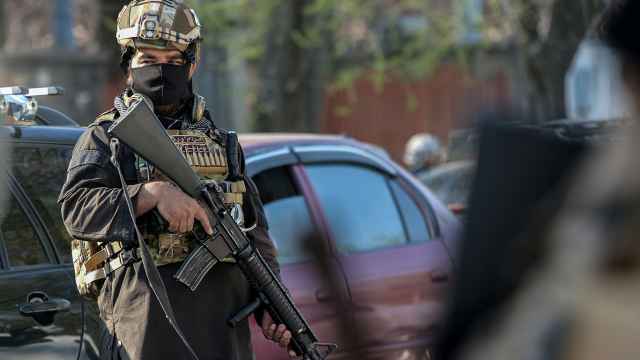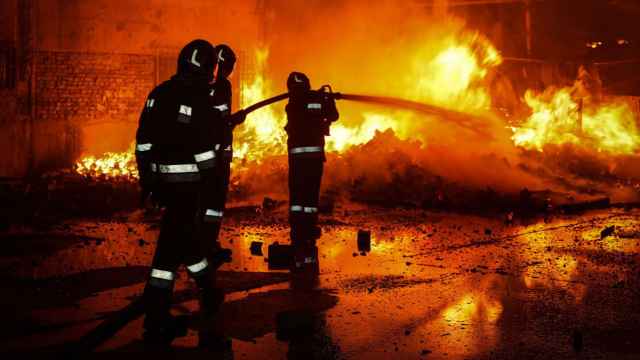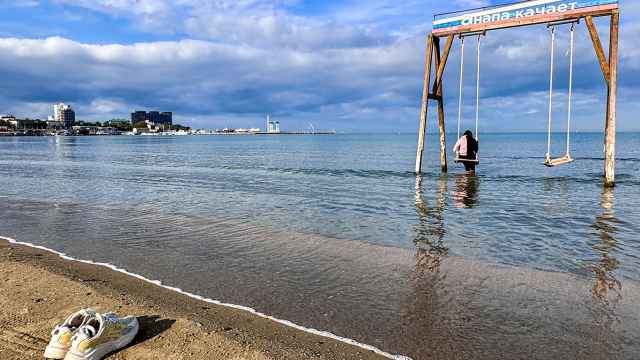KIEV — As the ultimatum issued by the opposition to the Ukrainian president to call early elections or face chaos expired on Thursday, the frontline between police and protesters on Vulitsya Hrushevskoho resembled a post-apocalyptic landscape.
The scene reflects the radicalization of the protest movement. A wall of fire and black smoke separates the protesters from police, and protesters keep up the tension by banging on pieces of metal, setting off fireworks and throwing rocks and Molotov cocktails at police. The protesters themselves are armed with medieval-looking shields and wear gas masks.
Carcasses of burned-out buses and trucks covered by icicles left from a water cannon make the setting even more eerie. They have been dubbed "buses from hell."
The protests began in November as a reaction to President Viktor Yanukovych's decision to suspend an association deal with the European Union in favor of closer ties with Russia. They have since grown into a broader movement seeking to oust the president. On Wednesday, the opposition formed a "People's Rada" as an alternative center of power that some have called "a revolutionary government," and they set a 24-hour deadline for Yanukovych to announce early presidential and parliamentary elections.
The protest movement had remained mostly peaceful until Sunday, despite clashes on Vulitsya Hrushevskoho on Nov. 24 and on Bankovaya Vulitsya on Dec. 1. But after Yanukovych signed laws imposing serious penalties for some forms of protests and opposition activities last week, the protests — called the Euromaidan movement — took a violent turn, and demonstrators began to fight with police on Vulitsya Hrushevskoho. The clashes lasted from Sunday until Thursday.
The radicalization of the protests has led to speculation about the possible use of firearms by protesters. On Tuesday, the Ukrainian Association of Gun Owners published an appeal to the Interior Ministry expressing concern over an order that authorizes police to use firearms against demonstrators. Euromaidan leaders have urged gun owners to "defend their country."
The Euromaidan movement has also formed its own paramilitary units, which some have suggested should be turned into a "national militia" or "national guard."
As protesters became more radical in their actions, so did authorities.
Police enraged protesters by reportedly attacking medics and journalists, while pro-government activists, known as titushki, assaulted demonstrators. Several demonstrators died during the scuffles. Further escalating the tensions, an armored vehicle was brought to Vulitsya Hrushevskoho on Wednesday, and snipers were seen on roofs along the street.
As the authorities' actions become more violent, Yanukovych's chances of staying in power are diminishing, Ukrainian political analyst Vitaly Bala said by phone.
"After the reports of deaths, the issue of Yanukovych's resignation is just a matter of time," he said.
Ongoing anti-government protests on Vulitsya Hrushevskoho in Kiev on Jan. 20-22, 2014. Video by Oleg Sukhov
Observers have attributed the radicalization of the Euromaidan movement to growing disaffection with the authorities' apparent crackdown on protesters and opposition leaders' supposed inability to offer a way out of the crisis. The clashes have been driven mostly by nationalists and soccer fans, who took part in a great deal of the fighting, but other protesters also joined in.
Mikhailo Potko, a 48-year-old unemployed protester, said that the protesters' attack on riot police on Vulitsya Hrushevskoho on Sunday was done in response to police violence, including the crackdown on Maidan Nezalezhnosti on Nov. 30, which left several protesters injured. Potko also said the "dictatorial laws" passed last week were a contributing factor.
Roman Krutko, a 35-year old businessman, said that the violence had escalated because the authorities had not responded to a single demand from the protesters.
"We want Yanukovych's bones," he said.
Ignat, a 22-year-old student who did not give his last name for security reasons, echoed Krutko's sentiments.
"Yanukovych is not listening to the people," he said.
Initially, the protesters had hoped to attain their goals in a peaceful manner, but the authorities responded by repressing people's rights and liberties, Ignat said. In this situation, he said, violence is the only way out.
Alexander Zazulenko, a 70-year-old pensioner, had a different attitude. He said that he supported only peaceful protests and that the clashes had been organized by provocateurs who were hired by the authorities. Violent clashes would only help the authorities, he said, because they would give them an excuse to introduce a state of emergency.
Those who participated in earlier clashes with police in December were labeled agent provocateurs by opposition leaders Oleh Tyahnybok, Arseny Yatsenyuk and Vitali Klitschko, who had earlier urged protesters to stick to a peaceful path.
But the opposition's failure to reach the goals set by protesters has irritated many demonstrators, which was evident on Sunday when members of the crowd booed them at a rally at the Maidan Nezalezhnosti tent camp.
"We have been standing on Maidan for two months for nothing," Ignat said.
"The opposition has not proposed anything," he said.
By Wednesday, the opposition finally responded to protesters' demands and threw their support behind the violence on Vulitsya Hrushevskoho, saying further extreme actions could be necessary unless Yanukovych announced an early election.
Some have accused the opposition of being unable to fully grasp the complexity of the crisis, however.
Opposition leaders have failed to realize that the crisis is not only political but also economic and social, with the economy on the brink of bankruptcy, Bala said. The opposition has not offered specific policies to guide the nation in a post-Yanukovych period, he said.
The diminishing clout of the mainstream opposition has brought to the fore a nationalist umbrella organization called the Right-Wing Sector, which was a key force during clashes with police. It consists of the groups UNA-UNSO, SNA, Ukrainian Patriot, White Hammer and Trizub, and is linked to soccer fan groups known as "ultras."
It has also perhaps contributed to the overall rage of the movement, with more and more protesters predicting a violent end rather than peaceful resolution.
Demonstrator Timofei said that the president would definitely suffer as a result of his attempts to crack down on the protests.
"A fate worse than that of Gadhafi, Saddam Hussein or Ceausescu awaits him," he said.
Contact the author at o.sukhov@imedia.ru
A Message from The Moscow Times:
Dear readers,
We are facing unprecedented challenges. Russia's Prosecutor General's Office has designated The Moscow Times as an "undesirable" organization, criminalizing our work and putting our staff at risk of prosecution. This follows our earlier unjust labeling as a "foreign agent."
These actions are direct attempts to silence independent journalism in Russia. The authorities claim our work "discredits the decisions of the Russian leadership." We see things differently: we strive to provide accurate, unbiased reporting on Russia.
We, the journalists of The Moscow Times, refuse to be silenced. But to continue our work, we need your help.
Your support, no matter how small, makes a world of difference. If you can, please support us monthly starting from just $2. It's quick to set up, and every contribution makes a significant impact.
By supporting The Moscow Times, you're defending open, independent journalism in the face of repression. Thank you for standing with us.
Remind me later.






